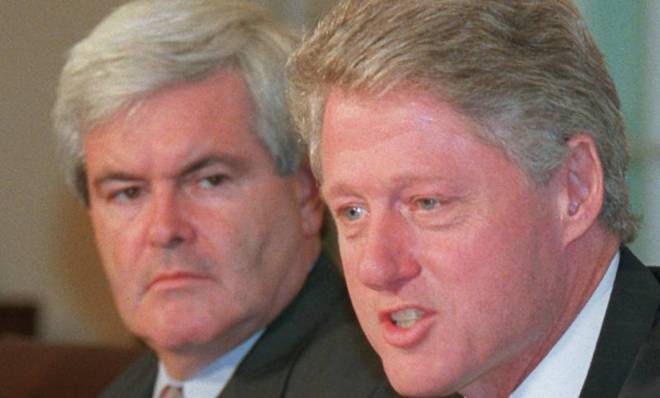Even government shutdowns were better in the '90s
- Select a language for the TTS:
- UK English Female
- UK English Male
- US English Female
- US English Male
- Australian Female
- Australian Male
- Language selected: (auto detect) - EN

Play all audios:

The first government shutdown in 17 years drags on, and people are getting sick of it.
The poll numbers released this week are nothing short of stunning. In an Associated Press-GfK poll, Congress got an absurd five percent approval rating. Meanwhile, Gallup took a trip down
memory lane, comparing the current shutdown to the one in 1995-96 — and despite the ubiquity of Hootie and the Blowfish, Americans were more optimistic about the situation in the '90s than
they are now:
Not only do more people think we're in a crisis now, they are also more critical of Washington. Today, 57 percent of Americans think worse of President Barack Obama because of his leadership
during the shutdown, compared to only 49 percent who thought the same of President Bill Clinton.
Escape your echo chamber. Get the facts behind the news, plus analysis from multiple perspectives.
Bill Clinton and I would talk, if not every day...we would talk five days a week before the shutdown, after the shutdowns. We met face to face for 35 days in the White House trying to hammer
things out. When you get to know somebody, even when you're fighting hard, you kind of understand where the other person is coming from and they're not some demonized figure. [CNN]
It is hard to imagine a similar relationship developing between President Obama and House Speaker John Boehner (R-Ohio), who unlike Gingrich does not speak for his whole caucus. Even if
Boehner wanted to strike a deal with Obama, he would have to sell it to the Tea Party, an extremist wing Gingrich didn't have to worry about because Republicans represented much more
moderate districts in 1995.
Back then, Republicans actually had to worry about being challenged by a Democrat, as opposed to today's polarized climate in which losing your job is only a compromise and a primary away.
Hence the GOP's willingness to defund the government — and even send the U.S. into default.
This is all taking place in the aftermath of one of the worst recessions in American history. In 1995, the United States was in the middle of an economic boom, while today's economy is
stagnant.
"This isn't to say that a government shutdown is unprecedented," The Daily Beast's Daniel Gross argues. "But a government shutdown in an economy that looks like today's economy is
unprecedented."
The U.S. economy and Washington's reputation recovered after the last shutdown. It's not clear that the same is going to happen after this one.
Keith Wagstaff is a staff writer at TheWeek.com covering politics and current events. He has previously written for such publications as TIME, Details, VICE, and the Village Voice.